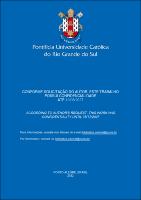| Share record |


|
Please use this identifier to cite or link to this item:
https://tede2.pucrs.br/tede2/handle/tede/10369Full metadata record
| DC Field | Value | Language |
|---|---|---|
| dc.creator | Costa, João Santos da | - |
| dc.creator.Lattes | http://lattes.cnpq.br/7412934905473433 | por |
| dc.contributor.advisor1 | Lopes Jr., Aury Celso Lima | - |
| dc.contributor.advisor1Lattes | http://lattes.cnpq.br/4629371641091359 | por |
| dc.date.accessioned | 2022-08-12T21:07:46Z | - |
| dc.date.issued | 2022-07-26 | - |
| dc.identifier.uri | https://tede2.pucrs.br/tede2/handle/tede/10369 | - |
| dc.description.resumo | O presente trabalho detém-se no propósito de reestruturar, em termos de significância, o conceito de fundamentação judicial no processo penal, a partir da decisão que recebe a pretensão acusatória na fase de admissibilidade, antecedente à instrução e ao julgamento. A investigação centra-se em dois eixos epistêmicos, o controle de convencionalidade e o garantismo processual penal. O primeiro sugere a efetivação das normas convencionais de forma direta e imediata no âmbito da jurisdição processual penal como condição de procedibilidade, isto é, de legitimação do próprio processo. O segundo visa demonstrar que a decisão judicial, enquanto ato de poder circunspecta a elementos cognitivos, éticos e normativos, encontrará no conceito de fundamentação adequada um espaço de controle das garantias convencionais do devido processo. Trata-se de um trabalho pautado em uma pesquisa inter e transdisciplinar que valoriza os métodos indutivo e sistêmico na medida em que se presta a organizar conhecimentos em favor da construção de uma nova mentalidade. Assim, a inferência resultante do contexto das teorias da convencionalidade e os estudos jus filosóficos em torno do conceito de poder sugerem um novo aporte teórico para o conceito de fundamentação adequada no processo penal. A tese alcançada é sugerida em termos pragmáticos, de modo que não se reconhecerá como devidamente fundamentada a decisão que receba a denúncia ou queixa que não exclua a violação de garantias convencionais do devido processo, especificamente aquelas constantes da Convenção Americana de Direitos Humanos. | por |
| dc.description.abstract | The present work focuses on the purpose of restructuring, in terms of significance, the concept of judicial reasoning in criminal proceedings as from the decision that receives the accusatory claim in the admissibility phase, prior to the investigation and judgment. The investigation is supported on two epistemic axes, conventionality control and criminal procedural guarantees. The first suggests the implementation of conventional norms directly and immediately within the scope of criminal procedural jurisdiction as a condition of processability, that is, of legitimation of the process itself. The second aims to demonstrate that the judicial decision, as an act of power circumspect to cognitive, ethical and normative elements, will find in the concept of adequate reasoning a space for controlling the conventional guarantees of due process. It is a work based on inter and transdisciplinary research that values inductive and systemic methods insofar as it lends itself to organizing knowledge in favor of the construction of a new mentality. Thus, the inference resulting from the context of theories of conventionality and jus-philosophical studies around the concept of power suggest a new theoretical contribution to the concept of adequate foundations in criminal proceedings. The thesis reached is suggested in pragmatic terms, so that the decision that receives the complaint, either public or private, that does not exclude the violation of conventional guarantees of due process, specifically those contained in the American Convention on Human Rights, will not be recognized as duly substantiated. KEY-WORDS: Conventionality; Power control; Legitimation; Motivation | eng |
| dc.description.provenance | Submitted by PPG Ciências Criminais ([email protected]) on 2022-08-11T19:09:02Z No. of bitstreams: 1 JOAO_SANTOS_COSTA_TESE.pdf: 2490261 bytes, checksum: 26118fa88c9b3d47e482f416398d2ed5 (MD5) | eng |
| dc.description.provenance | Approved for entry into archive by Sheila Dias ([email protected]) on 2022-08-12T20:50:26Z (GMT) No. of bitstreams: 1 JOAO_SANTOS_COSTA_TESE.pdf: 2490261 bytes, checksum: 26118fa88c9b3d47e482f416398d2ed5 (MD5) | eng |
| dc.description.provenance | Made available in DSpace on 2022-08-12T21:07:46Z (GMT). No. of bitstreams: 1 JOAO_SANTOS_COSTA_TESE.pdf: 2490261 bytes, checksum: 26118fa88c9b3d47e482f416398d2ed5 (MD5) Previous issue date: 2022-07-26 | eng |
| dc.format | application/pdf | * |
| dc.thumbnail.url | https://tede2.pucrs.br/tede2/retrieve/184866/TES_JOAO_SANTOS_DA_COSTA_CONFIDENCIAL.pdf.jpg | * |
| dc.language | por | por |
| dc.publisher | Pontifícia Universidade Católica do Rio Grande do Sul | por |
| dc.publisher.department | Escola de Direito | por |
| dc.publisher.country | Brasil | por |
| dc.publisher.initials | PUCRS | por |
| dc.publisher.program | Programa de Pós-Graduação em Ciências Criminais | por |
| dc.rights | Acesso Aberto | por |
| dc.subject | Convencionalidade | por |
| dc.subject | Controle de Poder | por |
| dc.subject | Legitimação | por |
| dc.subject | Fundamentação | por |
| dc.subject.cnpq | CIENCIAS SOCIAIS APLICADAS::DIREITO | por |
| dc.title | (In)constitucionalidade e (in)convencionalidade na ausência de fundamentação da decisão que recebe a acusação no processo penal brasileiro | por |
| dc.type | Tese | por |
| dc.restricao.situacao | Trabalho será publicado como artigo ou livro | por |
| dc.restricao.prazo | 60 meses | por |
| dc.restricao.dataliberacao | 12/08/2027 | por |
| Appears in Collections: | Programa de Pós-Graduação em Ciências Criminais | |
Files in This Item:
| File | Description | Size | Format | |
|---|---|---|---|---|
| TES_JOAO_SANTOS_DA_COSTA_CONFIDENCIAL.pdf | JOAO_SANTOS_DA_COSTA_TES | 493.01 kB | Adobe PDF |  Download/Open Preview |
Items in DSpace are protected by copyright, with all rights reserved, unless otherwise indicated.




